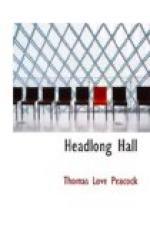The sexton concluded his speech with an approving smile at his own sagacity, in so luminously expounding the nature of Owen Thomas’s mistake.
“I perceive,” said Mr Escot, “you have a very deep insight into things, and can, therefore, perhaps, facilitate the resolution of a question, concerning which, though I have little doubt on the subject, I am desirous of obtaining the most extensive and accurate information.”
The sexton scratched his head, the language of Mr Escot not being to his apprehension quite so luminous as his own.
“You have been sexton here,” continued Mr Escot, in the language of Hamlet, “man and boy, forty years.”
The sexton turned pale. The period Mr Escot named was so nearly the true one, that he began to suspect the personage before him of being rather too familiar with Hugh Llwyd’s sable visitor. Recovering himself a little, he said, “Why, thereapouts, sure enough.”
“During this period, you have of course dug up many bones of the people of ancient times.”
“Pones! Cot pless you, yes! pones as old as the ’orlt.”
“Perhaps you can show me a few.”
The sexton grinned horribly a ghastly smile. “Will you take your Pible oath you ton’t want them to raise the tevil with?”
“Willingly,” said Mr Escot, smiling; “I have an abstruse reason for the inquiry.”
“Why, if you have an obtuse reason,” said the sexton, who thought this a good opportunity to show that he could pronounce hard words as well as other people; “if you have an obtuse reason, that alters the case.”
So saying he lead the way to the bone-house, from which he began to throw out various bones and skulls of more than common dimensions, and amongst them a skull of very extraordinary magnitude, which he swore by St David was the skull of Cadwallader.
“How do you know this to be his skull?” said Mr Escot.
“He was the piggest man that ever lived, and he was puried here; and this is the piggest skull I ever found: you see now——”
“Nothing can be more logical,” said Mr Escot. “My good friend will you allow me to take this skull away with me?”
“St Winifred pless us!” exclaimed the sexton, “would you have me haunted py his chost for taking his plessed pones out of consecrated cround? Would you have him come in the tead of the night, and fly away with the roof of my house? Would you have all the crop of my carden come to nothing? for, look you, his epitaph says,
“He that my pones shall
ill pestow,
Leek in his cround shall never
crow.”
“You will ill bestow them,” said Mr Escot, “in confounding them with those of the sons of little men, the degenerate dwarfs of later generations; you will well bestow them in giving them to me: for I will have this illustrious skull bound with a silver rim, and filled with mantling wine, with this inscription, NUNC TANDEM: signifying that that pernicious liquor has at length found its proper receptacle; for, when the wine is in, the brain is out.”




